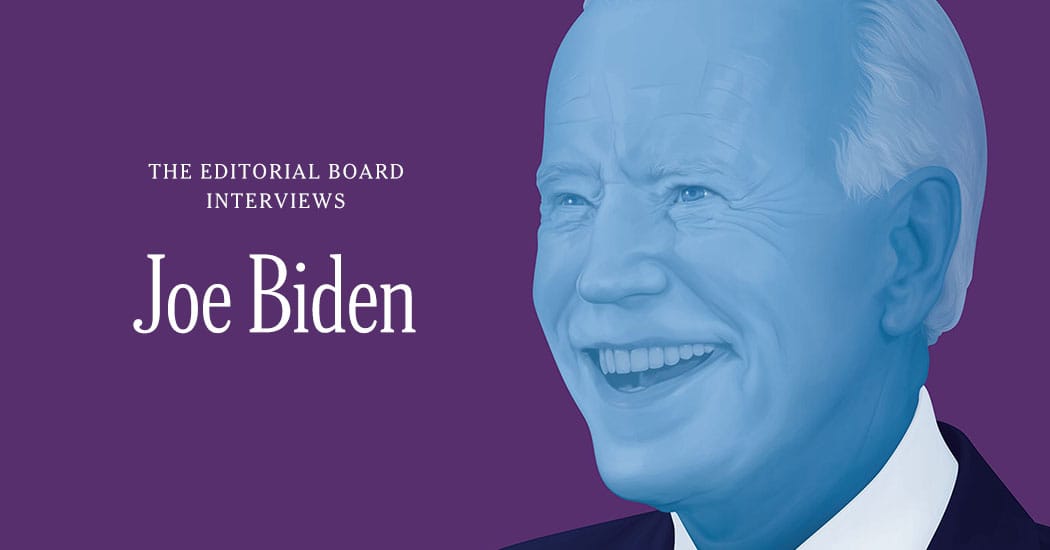In Interview With New York Times Editorial Board, Joe Biden Urges Revoking Section 230
WASHINGTON, January 22, 2020 – Former Vice President Joe Biden called for the repeal of Section 230 of the Communications Decency Act, a piece of legislation passed in 1996 that has proved pivotal to the growth of computer networks and social media. In an interview conducted by The New York Times

WASHINGTON, January 22, 2020 – Former Vice President Joe Biden called for the repeal of Section 230 of the Communications Decency Act, a piece of legislation passed in 1996 that has proved pivotal to the growth of computer networks and social media.
In an interview conducted by The New York Times Editorial Board in seeking the newspaper’s endorsement, Biden said that Facebook was hiding behind Section 230 in permitting advertisements that falsely claimed Biden blackmailed Ukrainian officials not to investigate his son Hunter Biden. The solution, said Biden, was a wholesale repeal of the law.
Section 230 protects technology platforms companies like Facebook and Google from liability for users’ comments on their social network. However, it does not prevent the platforms from being sued for the content that they author.
Reacting to Biden’s pronouncement, a member of the Times’ editorial board reacted: “That’s a pretty foundational laws [sic] of the modern internet.”
“That’s right. Exactly right,” Biden responded. “And it should be revoked. It should be revoked because it is not merely an internet company. It is propagating falsehoods they know to be false, and we should be setting standards not unlike the Europeans are doing relative to privacy. You guys still have editors. I’m sitting with them. Not a joke. There is no editorial impact at all on Facebook. None. None whatsoever. It’s irresponsible. It’s totally irresponsible.”Biden went on to analogize Facebook to The New York Times: Just as the newspaper would face civil liability for the material it has published, Facebook should not have some added layer of immunity for the content – including the false advertisements highlighted by Biden – published on Facebook.Biden is not alone in his dissatisfaction with Section 230. The debate crosses party lines, but for different reasons.
Free Press Action Senior Policy Counsel Gaurav Laroia said the criticism is going two different ways. Democrats want modifications to combat hate speech, while Republicans want to reexamine Section 230 in the context of alleged anti-conservative bias by platform companies, Laroia said.
Laroia believes that social media as we know it would never have developed without Section 230, because the law allows technology companies to create terms of service without holding them liable for over- or under-censoring the speech of others.
Speaking for the non-profit advocacy group Free Press, Laroia said “repealing Section 230 as Biden recommends would return us to the world of the early and mid ’90s, when the law gave internet companies a choice — either allow nearly all speech and posts, including hate speech and falsehoods, with few rules and nearly no moderation, or assume editorial and legal responsibility for every single post or utterance on their sites.”
Laroia took issue with Biden’s analogy between Facebook and The New York Times. Without Section 230, Laroia said, everything would have to be edited through a single editor.
But in regard to speech and privacy rules in Europe, Laroia said the EU has a “far more developed speech regime” because it can make laws that the First Amendment in the United States would not permit.
Indeed, the First Amendment specifically protects hate speech, but Section 230 was meant to facilitate moderation online, said Laroia. Section 230 is not intended to treat online platforms like a newspaper, he said. While changes may be necessary to Section 230, he said, revision of Section 230 would need to be deliberate and careful.
The Times did not endorse Biden; it instead endorsed both Sen. Amy Klobuchar, D-Minn., and Sen. Elizabeth Warren, D-Mass.








